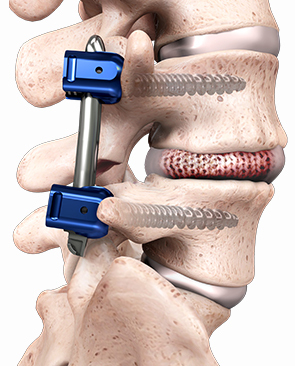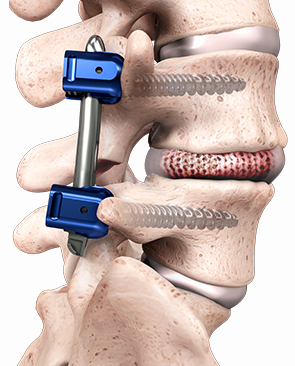ST. PAUL, Minn.--(BUSINESS WIRE)--Spineology Inc., an innovator in anatomy-conserving spine surgery, is excited to announce that John Chi, M.D., M.P.H., Associate Professor of Neurosurgery at Harvard Medical School and the Director of Neurosurgical Spinal Oncology at Brigham and Women’s Hospital in Boston, Massachusetts, presented 12-month outcomes data from Spineology’s SCOUT clinical trial at the recent annual meeting of the North American Spine Society (NASS) in Los Angeles, California.
The SCOUT study (Spineology Clinical Outcomes Trial), conducted under an FDA-approved IDE protocol, is a prospective multicenter non-randomized performance goal investigation, designed to evaluate safety and effectiveness outcomes in instrumented lumbar interbody fusion procedures for the treatment of degenerative disc disease (DDD).
The fusion implant used in the SCOUT Study is Spineology’s porous graft containment mesh that deploys within the disc space as it is filled, permitting the packed bone graft to conform to the prepared vertebral body endplates. The system’s design allows for disc space preparation and implant placement through a small cannula.
The SCOUT trial includes 102 patients who were experiencing painful lumbar degenerative disc disease of at least six months’ duration. Patients are skeletally mature adults with single-level symptomatic lumbar DDD requiring interbody fusion. Patients have been enrolled at ten participating study sites, and study enrollment is complete. Dr. Chi and his co-authors reported on 102 treated subjects, of whom 80 have completed 12-month postoperative follow-up and 27 of have completed 24-month follow-up.
Statistically significant improvements were seen at six months, twelve months and 24 months in scores for low back pain and functional limitations, as recorded by Visual Analog Scale (VAS) and Oswestry Disability Index (ODI) respectively. At the primary fusion endpoint of 12-months 65 of 70 (93%) with available films were fused, as read on CT by two independent radiologists. Eighty nine percent (89%) of subjects reported “Excellent” or “Good” patient satisfaction at 12 months (71 of 80) and 24 months (24 of 27). Safety was excellent. There were no unanticipated adverse events and no interbody device-related serious adverse events.
“We have found this innovative minimally invasive graft containment device to be a safe and effective option for lumbar interbody fusion procedures,” said Dr. Chi. “Patient- reported outcomes are very favorable, including improved function, reduced pain, and high satisfaction rates. Combined with excellent safety and radiographic fusion, the SCOUT study is demonstrating very favorable results.”
The list of nationwide study sites participating in the SCOUT IDE includes Brigham and Women’s Hospital, University of Vermont, the Spine Institute of Louisiana, Florida Orthopaedic Associates, and Georgetown University, among others. Details of the study may be found at the NIH clinical trials website, https://clinicaltrials.gov/ct2/show/NCT02347410?spons=spineology&rank=1.
Spineology’s OptiMesh® deployable implant received 510(k) clearance from FDA in 2003 for graft containment within the vertebral body. The SCOUT trial is designed to provide clinical data in support of a regulatory submission to FDA for expanded indications, allowing the company to market the implant to be used with bone graft and supplemental posterior fixation in support of lumbar interbody fusion for treating painful DDD.
Spineology CEO John Booth said, “We are very pleased to know that SCOUT patients have reported these high satisfaction rates and good clinical improvements with their fusion success. We look forward to continuing patient follow-up and gaining the market clearance that will allow us to market this unique fusion device. We are grateful to Dr. Chi and all the SCOUT investigators for their commitment to this important clinical trial.”
About Spineology Inc.
Spineology Inc. provides innovative,
anatomy-conserving spinal technologies for surgeons and their patients.
Spineology surgical techniques conserve spinal bone, ligament and muscle
tissue. Spineology is committed to increasing procedural efficiency,
reducing surgical morbidity and accelerating patient recovery. Learn
more at spineology.com.




